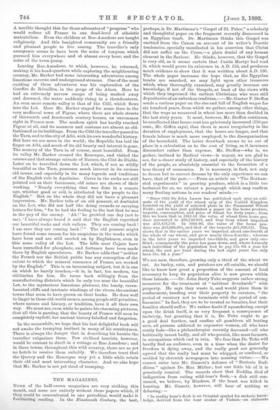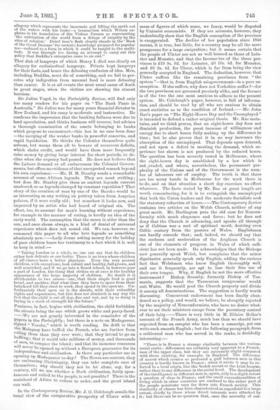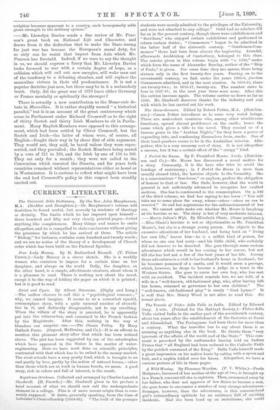THE MAGAZINES.
NONE of the half-crown magazines are very striking this month, and none are entirely without those papers which, if they could be concentrated in one periodical, would make it fascinating reading. In the Nineteenth Century, the best, perhaps, is Dr. Martineau's "Gospel of St. Peter," a scholarly and thoughtful paper on the fragment recently discovered in an Egyptian tomb, Dr. Martineau thinks this Gospel was omitted from the Canon on account of its writer's Docetic tendencies, specially manifested in his assertion that Christ did not suffer on the Cross,—a plain denial of any human element in the Saviour. He thinks, however, that the Gospel is very old, as it seems certain that Justin Martyr had read it, which would prove its existence in A.D. 150, and produces much evidence to show that it was writtten about A.D. 130.
The whole paper increases the hope that, as the Egyptian tombs are searched, we may light upon other treasures which, when thoroughly examined, may greatly increase our knowledge, if not of the Gospels, at least of the views with which they impressed the earliest Christians who were still depositaries of an unbroken tradition.—Mr. Gustav F. Steffen sends a curious paper on the rise and fall of English wages for six hundred years, from which we gather, among other things, that the wage as measured in wheat has more than doubled in the last sixty years. It must, however, Mr. Steffen continues, be recollected that house-rent has grievously increased (150 per cent., Mr. Giffen says), that there is more irregularity in the duration of employment, that the hours are longer, and that female labour is much more employed, to the disorganisation of the household. The latter drawback seems to us out of place in a calculation as to the cost of living, as it increases discomfort rather than expense. Mr. Steffen—who is, we gather, inclined to Radical views—is urgent, we are glad to see, for a closer study of history, and especially of the history of the people, as absolutely essential to the formation of a true theory of economics. It is necessary, in fact, not only to dream but to correct dreams by the only experience we can have, that of the past.—From an article on "The Rotham- sted experiments" in growing produce, which is a little too technical for us, we extract a paragraph which may confirm many floating notions in our readers' minds :—
" Since 1852 Sir John Lewes has published each year an esti- mate of the yield of the wheat crop of the United Kingdom founded on the yield of selected plots in the Permanent Wheat Field; and he has just published a paper on the home produce, imports, consumption, and price of wheat for forty years ; from this we learn that in 1852-53 the value of wheat from home pro- duce amounted to £23,749.918, and that from wheat imported was £13,413,750. In 1891-92, the value of the home pro- duce was £13,965,684, and that of the imports 441,839,131. This shows that in the earlier years we imported about one-fourth of the whole of our wheat, and grew nearly three-fourths ; whereas in the later years we imported two-thirds, and grew only one- third ; consequently the price has gone down, and, where formerly each individual of the population had to pay 37s. 6d. a year for wheat, the cost per head during the last eight years has only been 24s. 8d. a year."
We are now, therefore, growing only a third of the wheat we eat. As barley, oats, and potatoes are all eatable, we should like to know how great a proportion of the amount of food necessary to keep its population alive is now grown within these Islands.—Dr. John Batty Take suggests rather strong measures for the treatment of "habitual drunkards" with property. He says they waste it, and would place them in confinement, handing over their property to curators, "the period of curatory not to terminate with the period of con- finement." In fact, they are to be treated as lunatics, lest their families should suffer. We rather doubt if squandering, except upon the drink itself, is so very frequent a consequence of inebriety, but granting that it is, Dr. Tuke ought to go a good deal further, and confine all gamblers, all betting men, all persons addicted to expensive women, all who have costly fads—like a philanthropist recently deceased—all who habitually invest badly, and all who persist, like most farmers, in occupations which end in ruin. We fear that Dr. Take will hardly find an audience, even in a time when the desire for freedom is dying away, and the really good are generally agreed that the really bad must be whipped, or confined, or scolded by shrewish newspapers into seeming virtue.—We cannot enter into Mr. Sinnett's defence of "Esoteric Bud- dhism" against Dr. Max Muller ; but one little bit of it is genuinely comical. The records show that Buddha died of indigestion from eating wild-boar's flesh,—a dish still con- sumed, we believe, by Hindoos, if the beast was killed in hunting. Mr. Sinnett, however, will hear of nothing so debasing : —
"In reality boar's flesh is an Oriental symbol for esoteric know- ledge, derived from the boar avatar of Vishnu—an elaborate
allegory which represents the incarnate god lifting the earth out of the waters with his tusks—a transaction which Wilson ex- plains in his translation of the Vishnu Purana as representing the extrication of the world from a deluge of iniquity by the rites of religion.' Dried boar's flesh clearly stands in the Book of the Great Decease' for esoteric knowledge prepared for popular Use—reduced to a form in which it could be taught to the multi- tude. It was through too daring an attempt to carry out this policy that Buddha's enterprise came to an end."
That dish of lampreys of which Henry I. died was clearly an allegory for ecclesiastical lampreys. Priests kept lampreys for their fasts, and hence the debasing confusion of idea. Men, including Buddha, must die of something, and we fail to per- eeive why indigestion from unusual food is more debasing than cancer. It is at all events the most usual cause of death in great sieges, when the victims are showing the utmost heroism.
Sir Julius Vogel, in the Fortnightly Review, will find only too many readers for his paper on "The Bank Panic in Australia." Sir Julius was for many years financial dictator in New Zealand, and his essay is moderate and instructive. He confirms the impression that the banking failures were due to land speculation, and thinks business will recover, but advises a thorough examination of the assets belonging to banks which propose to reconstruct—this has in no case been done —the merging of the weaker banks in powerful concerns, and rapid liquidation. He thinks the Colonies themselves quite solvent, but warns them all to beware of recurrent deficits, which shake credit, and would have them more frequently raise money by giving large interest for short periods, to de- cline when the urgency had passed. He does not believe that the Labour demand at all embarrasses the Colonial Govern- ments, but offers no evidence of that unexpected remark beyond his own experience.—Mr. H. M. Stanley sends a remarkable account of some African legends. They are most striking ; but does Mr. Stanley give them as ancient legends current unaltered, or as legends changed by constant repetition P That story of the creation of man by one of the Basoko would be as interesting as any writing on pottery taken from Assyrian palaces, if it were really old ; but somehow it looks new, and improved by an artist who had heard of original sin. The effort, too, to account for man's learning without experience, for example in the manner of eating, is hardly an idea of the early world. The assumption that the moon is older than the sun, and once shone always, is a kind of denial of universal experience which does not sound old. We can, however, re- commend this paper to all who love legends as something absolutely new.—Lady Jenne asking money for the holiday of poor children bears her testimony to a fact which it is well to keep in mind :— "Taking London as a whole, no one can say that its children either look delicate or are feeble. There is no town where children IA all classes have a better physique. Even the very poorest children, with exceptions, look robust and healthy, full grown, and well nourished, and if we go into a Board school, in however poor a part of London, the thing that strikes us at once is the healthy appearance of the large majority of children. No doubt it is attributable to two causes—one, that their staple food is good bread, and another, that what time they have to spare from their babyhood till they start to work, they spend in the open air. Un- fortunately their open air is the streets, with their unhealthy sights and experiences, but this does not diminish in any way the fact that the child is out all day, fine and wet, and by so doing is laying in a stock of strength for the future."
Puniness, in fact, begins with civilisation, the child forbidden the streets being the one which grows white and pasty-faced.
--We are not greatly interested in the remainder of the Papers in the Fortnightly; but there is a note on Madagascar, eigned " Vazaha," which is worth reading. Its drift is that the Malagasy have baffled the French, who are further from ruling them than they ever were ; that they intend to go on baffling ; that it would take millions of money, and thousands
of men, to conquer the island; and that its immense resources will never be opened up without a European guarantee for its
independence and civilisation. Is there any particular use in opening up Madagascar to-day ? The Hovas are content, they are embracing Christianity, they can take complete care of 'themselves ; why should they not be let alone, say, for a century, till we see whether a Dark civilisation, fairly spon- taneous and suited to the people, is not possible? There is the mainland of Africa to reduce to order, and the great island ean wait.
In the Contemporary Review, Mr. J'. G. Colelough assails the usual view of the comparative prosperity of Ulster with a mass of figures of which some, we fancy, would be disputed by Unionist economists. If they are accurate, however, they undoubtedly show that the English conception of the province is exaggerated. The decline of her population since 1846 means, it is true, but little, for a country may be all the more prosperous for a large emigration; but it seems certain that the people of Ulster are not as well housed as those of Lein- ster and Munster, and that the Income-tax of the three pro- vinces is £10 9s, 9d. for Leinster, Et I8s. 4d. for Munster, and 26 28. 4d. for Ulster, which is far from being the view generally accepted in England. The deduction, however, that Ulster suffers like the remaining provinces from "the system "—that is, from English misgovernment—is a pure as- sumption. If she suffers, why does not Yorkshire suffer P—for the two provinces are governed precisely alike, and the former is of the two the one most anxious to adhere to the present system. Mr. Colclough's paper, however, is full of informa- tion, and should be read by all who are anxious to obtain exact statistics as to the condition of Ireland.—Mr. John Rae's paper on "The Eight-Hours Day and the Unemployed" is intended to defend a rather original thesis. Mr. Rae main- tains, and we think proves, that an eight-hours day does not diminish production, the great increase of willingness and energy due to short hours fully making up the difference in time ; but he also proves that it in no way increases the absorption of the unemployed. That depends upon demand, and not upon a defect in meeting the demand, which ex- perience has shown is not produced by the reduced hours. The question has been severely tested in Melbourne, where the eight-hours day is established by a law which is not ,evaded, and where, nevertheless, the permanent per- plexity of the Unions and of the Government is the num- ber of labourers out of employ. The truth is that there are too many hands in Melbourne for the work there is to do, and on that situation a short day exercises no effect whatever. The facts stated by Mr. Rae at great length are worth remembering, for it is to extinguish the unemployed that both the Union leaders and the moderate Socialists seek the statutory reduction of hours.—The Contemporary Review contains two articles on the Welsh Church, neither of any great merit. Mr. Darlington puts the old case for Noncon- formity with much eloquence and force; but he does not deny that the Church is advancing, and speaks all through as if Celtism was a sort of spiritual merit, desiring even Celtic oratory from the pastors of Wales. Englishmen can hardly concede that; and, indeed, we should say that the coolness and moderation of the Anglican Church is one of the elements of progress in Wales of which suffi- cient has not been made. He acknowledges that the Bishops now generally speak Welsh, but complains that the minor dignitaries generally speak only English, adding the curious fact that Welshmen who know English thoroughly well, and use it frequently, are apt to lose their free use of their own tongue. Why, if English be not the more effective instrument Bishop Bromby, formerly Bishop of Tas- mania, suggests that the Tasmanian compromise would suit Wales. He would pool the Church property and divide it among all denominations. The suggestion is hardly worth discussing. Concurrent endowment has been finally aban- doned as a policy, and would, we believe, be abruptly rejected by the majority of Nonconformists, who have no desire what- ever to see their ministers escape from the pecuniary control of their laity.—There is very little in M. Hilaire Belloc's account of the French Army, much less than we should have expected from an essayist who has been a conscript, yet can write such smooth English ; but the following paragraph, from a cultivated man who has served in the ranks, is decidedly interesting:— "There is in France a strange similarity between the various social ranks ; differences are certainly very apparent to a French- man of the upper class, but they are extremely slight compared with those existing, for example, in England. The difference of accent which creates so profound a gulf between men in this country is hardly known in Prance; when it exists it may be re- ferred to a local origin, like the Scotch accent or the Irish brogue, rather than to any difference in the social level. The development of the intelligence in different men is, again, only to a slight extent a question of class in France ; and the small conventionalities of living which in other countries are confined to the richer part of the people penetrate very far down into French society. This similarity of classes has been characterised as superficial to a large extent, chiefly by those whose direct interests were attacked by it; but there can be no question that, once the necessity of con.-
scription becomes apparent to a country, such homogeneity adds great strength to the military system."
—Mr. Llewelyn Davies sends a fine review of Mr. Pear- son's great book on National Life and Character, and draws from it the deduction that to make the State strong for just war has become the European's moral duty, for so only can he resist that impact from Asia which Mr. Pearson has foretold. Indeed, if we were to say the thought in us, we should express a fancy that Mr. Llewelyn Davies looks forward to war with a certain degree of hope, as a collision which will call out new energies, will wake men out of the tendency to a debasing slumber, and will replace the masculine virtues in their old predominance. It is not a popular doctrine just now, but there may be in it a melancholy truth. Only, did the great war of 1870 leave either Germany or France mentally or spiritually the stronger ?
There is actually a new contribution to the Home-rule de- bate in Macmillan. It is rather stupidly named " a historical parallel," but it is an account of the great controversy which arose in Parliament under Richard Cromwell as to the right of thirty Scotch and thirty Irish Members to sit in Parlia- ment. Many English Members were opposed to this arrange- ment, which had been settled by Oliver Cromwell, but the Scotch and Irish—the latter of whom were, of course, all English—fought their way in by sheer dint of able argument. They would not, they said, be taxed unless they were repre- sented, and they prevailed ; the Scotch Members being seated by a vote of 211 to 120, and the Irish by one of 156 to 106. They sat only for a month ; they were not called to the Convention whia reseated the Stuarts, and for years both countries remained without representatives either at homE; or in Westminster. It is curious to reflect what might have been the end had Cromwell's policy in this respect been steadily carried out.








































 Previous page
Previous page